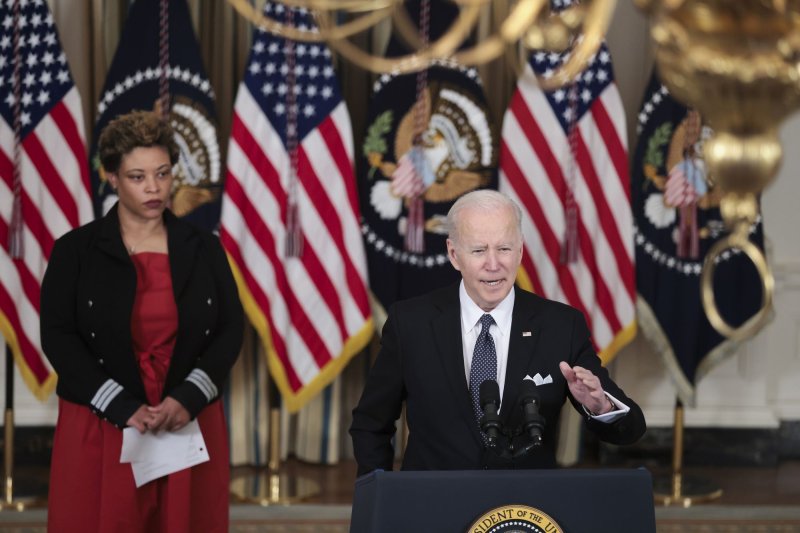The Office of Management and Budget under Director Shalanda Young (L) gave federal agencies 30 days from Monday to purge government devices of the Chinese-owned TikTok smartphone application. File Photo by Oliver Contreras/UPI |
License Photo
Feb. 27 (UPI) -- The White House on Monday informed federal agencies that they have 30 days to remove TikTok from all government devices amid mounting fears that U.S. data may end up in the hands of Chinese Communist Party members via the Chinese-owned social media platform.
The Office of Management and Budget gave the order in a memorandum that was sent Monday to the heads of executive departments and agencies. Congress had mandated the office develop standards over the social media platform's removal when it passed the No TikTok on Government Devices Act late last year.
The memorandum, which fulfills Congress' mandate, requires TikTok to be scrubbed within 30 days from all information technology owned or operated by federal agencies, as well as those used by federal contractors.
For years, Republicans have been warning that TikTok's Chinese parent company, ByteDance, could be compelled to hand over the data it has collected from U.S. users to the Chinese government.
Former President Donald Trump had sought to ban TikTok, along with WeChat -- a Chinese-owned messaging application -- via executive order in August 2020. The order was shelved the next month when a judge sided with a TikTok lawsuit against the move.
President Joe Biden in June 2021 rescinded the ban via an executive order of his own that directed a security review be taken. However, more than 20 Republican-led states took the issue into their own hands and ordered government bans at the state level with some Democratic-led states, such as Wisconsin, following.
The Department of Defense, the Transportation Security Administration and the House of Representatives have TikTok bans in place over national security concerns associated with the social media platform.
The issue has grown more bipartisan as relations between Washington and Beijing have frayed amid reports that U.S.-user data has been accessed by the Chinese government.
Earlier this month, Deputy Attorney General Lisa Monaco raised concerns over China's access to Internet companies in a speech in London on disruptive technologies.
"The Chinese government is not just hacking to gather our data. China's doctrine of 'civil-military fusion' means that any advance by Chinese company with military application must be shared with the state. And its national security law requires any company doing business in China to make its data accessible to the government.
"So, if a company operating in China collects your data, it is a good bet that the Chinese government is accessing it."
House Foreign Affairs Committee Chairman Rep. Michael McCaul, R-Texas, also introduced a bill late last week that would open the possibility for Biden to ban TikTok and other such applications.
The American Civil Liberties Union on Monday evening sent a letter to the House Foreign Affairs Committee voicing opposition to the ban, which it described as a censor that strips Americans of their right to freedom of speech.
"This vague and overbroad legislation would violate the First Amendment rights of millions of Americans who use TikTok to communicate, gather information and express themselves daily," the letter states.
"In a purported attempt to protect the data of U.S. persons from Chinese government acquisition, this legislation will instead limit Americans' political discussion, artistic expression, free exchange of ideas -- and even prevent people from posting cute animal videos and memes."
TikTok has repeatedly denied the accusations, but a New York Times' report in late December states that a ByteDance internal investigation found employees had obtained data on U.S. users.
TikTok representative Brooke Oberwetter told UPI in an emailed statement the "swiftest and most thorough way" to address national security concerns about TikTok is for the Committee on Foreign Investment to adopt the proposed agreement it has worked on for more than two years that seeks to address key issues, such as corporate governance, data security and system access.
Oberwetter also criticized the legislation that led to the ban of TikTok from federal devices, saying it passed without deliberation and has become "a blueprint for other world governments."
Canada on Monday similarly banned the social media platform from government devices. Last week, the European Commission, the executive arm of the 27-nation bloc European Union, banned TikTok from employee devices.
"These bans are little more than political theater," Oberwetter said. "We hope that when it comes to addressing national security concerns about TikTok beyond government devices, Congress will explore solutions that won't have the effect of censoring the voices of millions of Americans."
White House Press Secretary Karine Jean-Pierre told reporters earlier this month amid vocal bipartisan worries about TikTok that the Biden administration has never allowed the application on White House devices, and that they were focused on nations seeking to leverage digital technologies.
Asked if it was a security risk, she said it was being reviewed by CFIUS.
When Biden was asked that same day if the United States should ban TikTok, he said he wasn't sure.
"I know I don't have it on my phone," he said.















